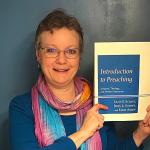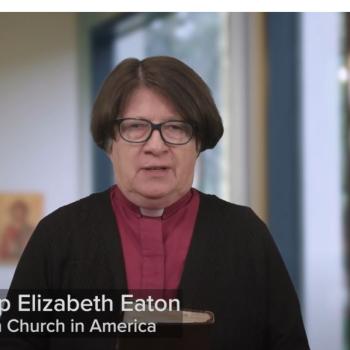Guest preachers and supply preachers face unique challenges and responsibilities that are different from those of a settled pastor. Here are some tips and advice.

The challenges for guest preachers and supply preachers
Maybe you’re a seminarian asked to fill in for a pastor’s vacation Sunday.
Or you’re invited to guest preach for a particular occasion or on a certain topic at a church.
Or perhaps you’ve been asked to preach for a local retirement home.
You might even be an interim pastor or just starting out in a new congregation.
In any of these cases, you won’t have the kind of knowledge of the congregation that a settled pastor has. This makes it challenging to craft a sermon that connects with your context when you’re not familiar with the congregation.
For example, you won’t know what individual congregants are dealing with. And it’s likely you won’t have more than a cursory understanding of what is happening in the local community or the congregation as a whole.
So how do you attend to your preaching context when you don’t know your context very well?
In my book, Introduction to Preaching: Scripture, Theology, and Sermon Preparation, co-authored with Jerry L. Sumney and Emily Askew, I suggest Five Questions for Exegeting a Preaching Context (Ch. 12). But it’s difficult to “exegete” (interpret) your preaching context for a congregation you don’t know.
So, we included an appendix for guest preachers and supply preachers about adapting the Five Questions for Exegeting a Preaching Context when you’re unfamiliar with the context (Appendix N).
Below are the Five Questions for Exegeting a Preaching Context and how they can be adapted if you are a guest preacher or supply preacher. You’ll also find some cautions and best practices in these situations.

Five Questions for Exegeting a Preaching Context When You’re Unfamiliar with the Context
1. What is happening in the world or society that is on people’s minds (or that they need to pay attention to)?
Supply preachers and guest preachers have an opportunity to address contemporary issues that a settled pastor might be hesitant to address. In fact, a guest preacher may be asked specifically to preach about a topic so that the congregation can hear a different voice or perspective.
Caution: Try not to leave a “mess” for the settled pastor to clean up in your wake.
If you push too hard with a prophetic word or intentionally trip some “land mines,” the person who gets the backlash may be the settled pastor after you’re gone.
Best practice: If possible, talk with the settled pastor ahead of time to get a sense of what they are hoping you will address – and what may be best to avoid – in the sermon.
If talking with the pastor is not possible, it’s best to err on the side of caution and avoid unnecessarily controversial topics — unless this is specifically what you’ve been asked to address.
2. What is happening in the local community?
If you have the opportunity, talk with the settled pastor to find out if there are issues going on in the local community that you should be aware of.
What things are people talking about?
Are there local conflicts, for example, that are affecting the congregation?
Are there celebrations or points of pride that you can point to or lift up?
If it’s not possible to talk with the settled pastor, other people you can ask are the church administrator, the worship leader/musician, or the head of the governing board. You can also do an Internet search to read the local newspaper and learn more about the context in which you’ll be preaching.
Caution: While it’s good to be aware of local issues, the same caution regarding global or societal issues applies here as well.
Unless you are truly up to speed on an issue, it’s usually best not to weigh in on a local controversy, especially if you’re an outsider to the community.
Best practice: Draw on the character and flavor of the community in a positive way if you’re going to reference the local area in a sermon.
An Internet search on the local community can tell you a great deal, but not everything. As they are practicing hospitality toward you by inviting you to preach, honor that with graciousness and respect.
3. What is happening in the congregation as a whole?
Again, talk with the settled pastor about the congregation. What will you be walking into on that Sunday morning? If you can’t ask the settled pastor, ask the church administrator, or whoever invited you to preach. You can also check out the church’s website and Facebook page as well as the newsletter to get a sense of the congregation, what’s important to them, and what’s on the horizon for their ministry.
Caution: Ask where the “sunburn” is.
In other words, what are sensitive areas or topics for a congregation that you should either avoid or handle with care?
Especially if you hope to be invited back in the future, the first time preaching to a church should be done with care so that you can establish trust and begin to build a positive relationship.
Best practice: One way to find out what’s important to the congregation is to ask what they’re studying in adult Sunday School classes or forums.
Also, what are they reading in their book clubs? And what service activities or mission trips are the youth planning or have recently completed?
You can also ask the settled pastor for a copy of the sermon they will have preached just prior to your coming so that you can tie in points they made the previous week or highlight a theme they addressed if it’s appropriate to do so in your own sermon.
4. What are individual congregation members dealing with?

This question will likely be the most difficult for a guest preacher or supply preacher to assess. Because you have no pastoral relationship with the members, you haven’t established the trust or the connections to be able to know what individuals are dealing with.
Caution: The settled pastor and the congregation certainly know the personal issues and the “quirky” folks in their midst and make accommodations, but some things may come as a surprise to you.
So, you can ask if there is anyone with special needs or concerns that you should be aware of as you are leading worship and preaching that morning.
Best practice: There are some questions you can ask the settled pastor or whoever hired you to preach so that you can get an idea of the people you might encounter and what’s on their minds.
You can ask: who am I likely to see on Sunday morning? What am I likely to notice? Will I see children or teens? Have there been any recent deaths that have affected the congregation? Can you highlight any recent celebrations or moments of joy? If appropriate, it may be possible to reference them in a general way in the sermon.
5. What are the political, cultural, and social dynamics that shape our hearing and interpretation of the text today?
As with Question 1, this question can also be emotionally charged and could result in backlash if a guest preacher or supply preacher hasn’t handled exercised caution. One way to gauge what you can say – and how you can say it – is to ask the settled pastor if there are any political, cultural, or social dynamics within the church that you should be aware of as you’re crafting your sermon.
Caution: Sometimes the settled pastor does not know their congregation as well as you (or they) might think.
For example, a pastor once invited me to supply preach for a congregation. I was assured that they would be open to hearing a sermon that addressed contemporary issues. However, it turned out that there were some individuals in the church who took offense at the mere mention of certain topics. This resulted in blowback both for me and for the settled pastor.
Sometimes the guest preacher can be the lightning rod for unresolved issues and feelings that the congregation has not processed in a healthy way.
Best practice: Avoid “trigger words” that might unnecessarily cause a hostile reaction.
For example, it’s usually best to avoid talking about politicians by name in a sermon.
Also, as I have discovered in my research, certain “buzz words” such as capitalism, climate change, and guns can cause a knee-jerk reaction for some listeners.
For guest preachers and supply preachers, it may be better to address more general biblical themes such as grace, forgiveness, or prayer. And to use stories and illustrations that are more neutral so as to avoid being unnecessarily provocative.
This doesn’t mean you have to deliver a milquetoast sermon. It simply means being strategic about what you say and how you say it.
Special thanks to the Rev. Dr. Erin Cash who gave suggestions and feedback on this article.
Read also:
Supply Preacher’s Checklist: Being Prepared to Guest Preach and Lead Worship
Using a ‘Dialogical Lens’ for Scripture and Preaching
Did AI (Artificial Intelligence) Write Your Pastor’s Sermon?
8 Ways to Prepare Your Congregation for Sermons about Social Issues
What is ‘Good Preaching’? A Sermon about Sermons

The Rev. Dr. Leah D. Schade is the Associate Professor of Preaching and Worship at Lexington Theological Seminary in Kentucky and ordained in the ELCA. Dr. Schade does not speak for LTS or the ELCA; her opinions are her own. She is the author of Preaching in the Purple Zone: Ministry in the Red-Blue Divide (Rowman & Littlefield, 2019) and Creation-Crisis Preaching: Ecology, Theology, and the Pulpit (Chalice Press, 2015). She is the co-editor of Rooted and Rising: Voices of Courage in a Time of Climate Crisis (Rowman & Littlefield, 2019). Her newest book is Introduction to Preaching: Scripture, Theology, and Sermon Preparation, co-authored with Jerry L. Sumney and Emily Askew (Rowman & Littlefield, 2023).













